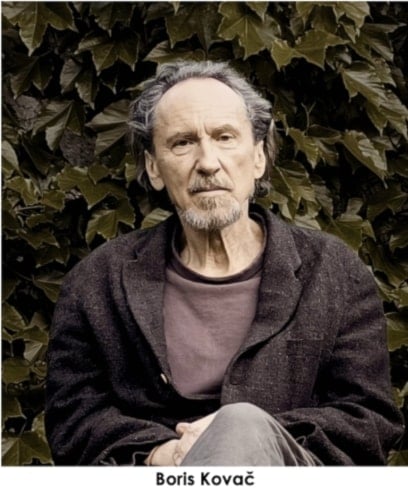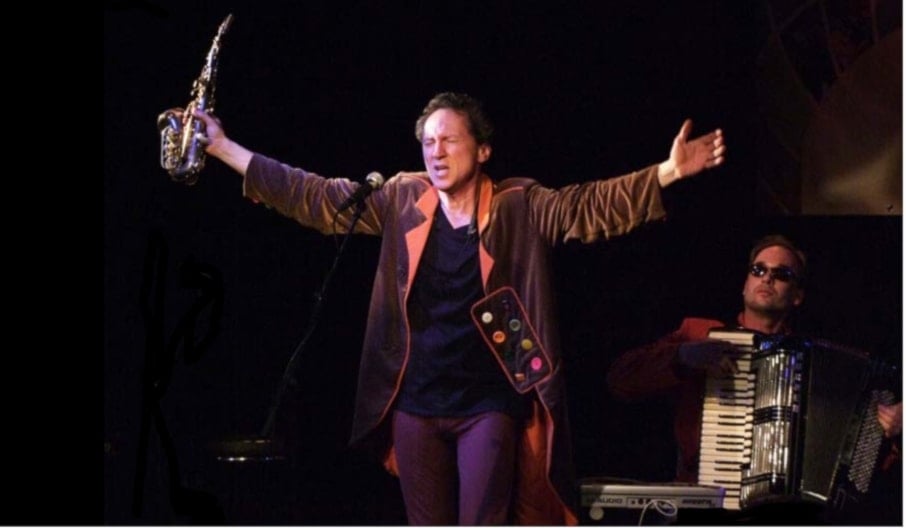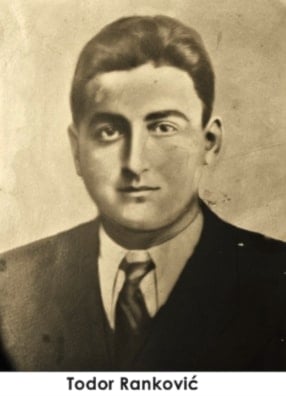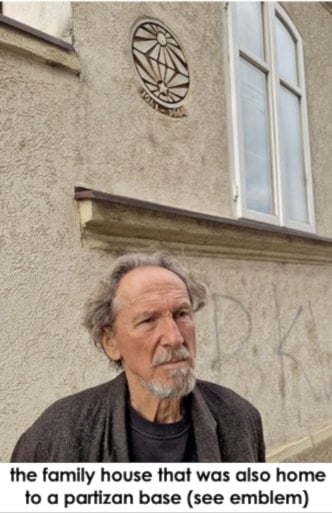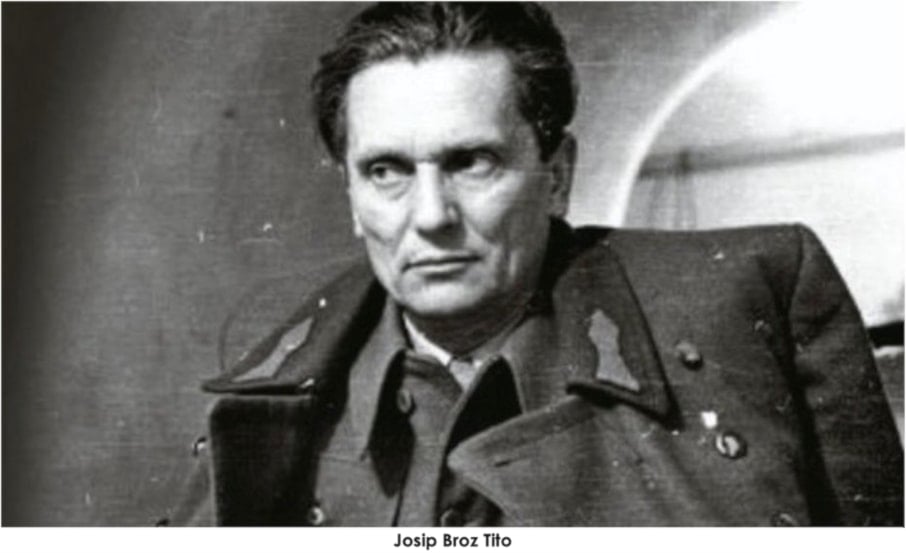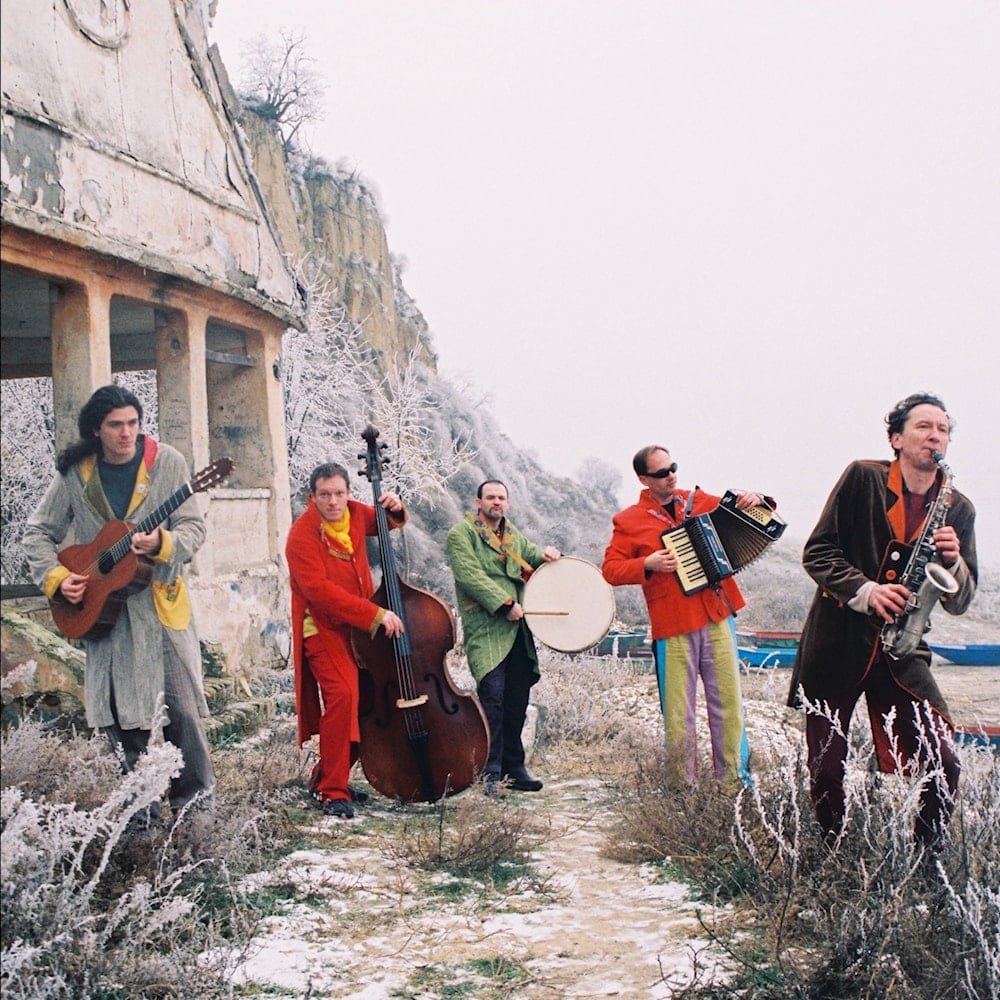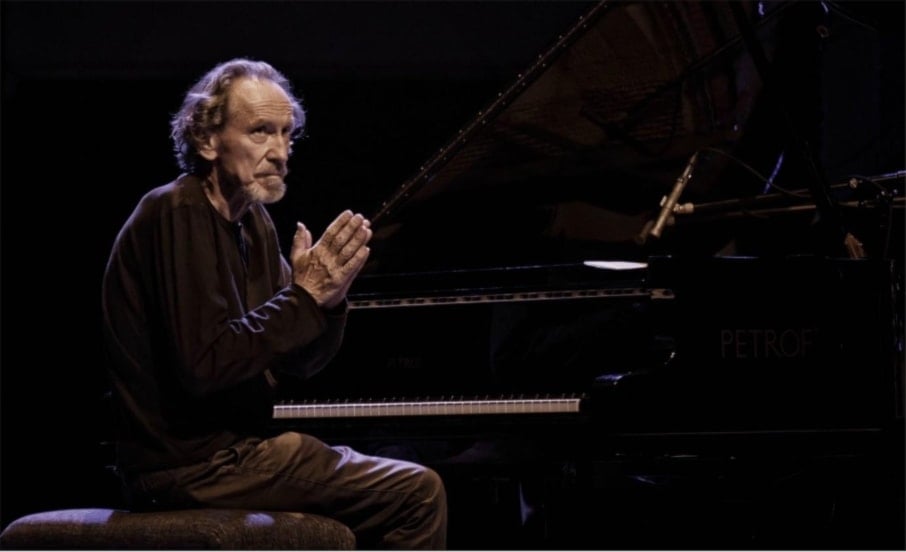La Danza Apocalypsa Balkanica: Musician-Philosopher Boris Kovac on Spiritual Resistance
In this interview, musician-philosopher Boris Kovac speaks about Tito's Yugoslavia, Serbia today, the enduring Partizan Movement and also about Resistance today and the struggle for a multipolar, sovereign world.
-
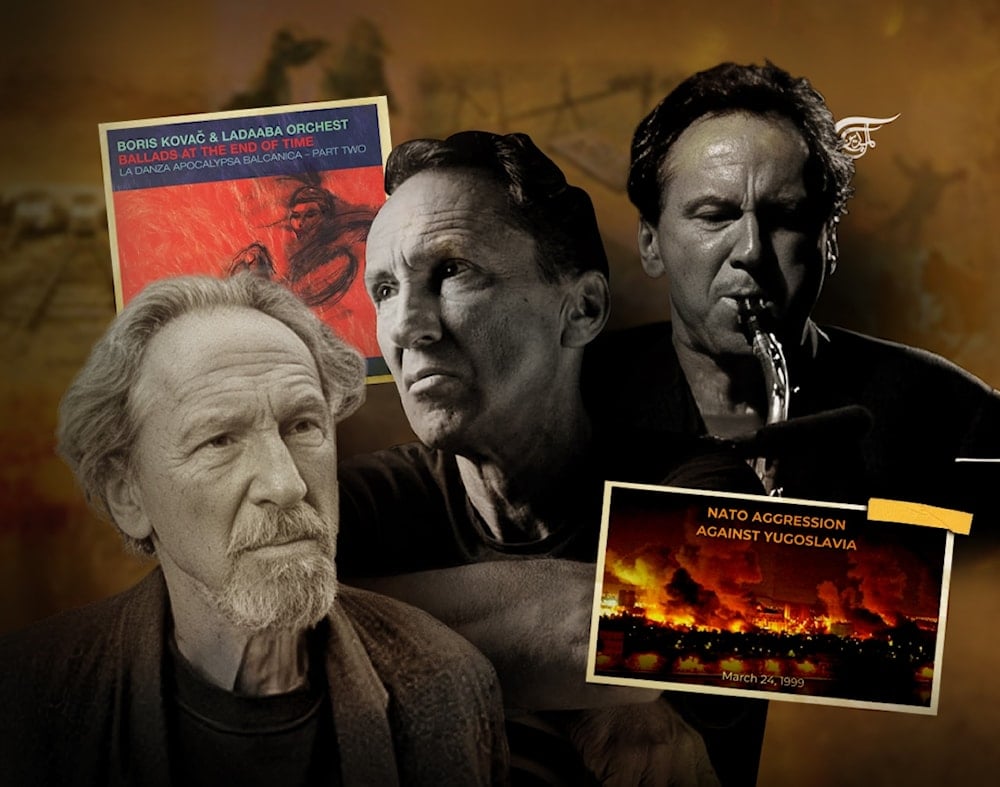
On this one starry night left till the end of this world, we must celebrate joy, faith, hope and love, at least one more time – we must dance… (Al Mayadeen English; Illustrated by Zeinab el-Hajj)
Boris Kovač, an honoured descendant of notable Yugoslav Partizan resistance fighters, is a renowned composer, musician and artist-filmmaker, whose birthplace and home is the Srem district of Vojvodina, in northern Serbia. Inspired by the 27 different ethnic groups populating this region of the ancient "Pannonian Plain", Boris's music covers a vast range of music genres, from improvised music, to tango, to "world music", to chamber classical; he has also composed music for theatre and cinema. Alongside his studies of philosophy, Boris has devoted much of his time to researching the Partizan movement and is currently making a film on the Partizans of Srem, portraying his uncle's participation and sacrifice. We speak to him about Yugoslavia, Serbia and what resistance movements can mean for the Global Majority today.
Praeludium: The Spirit of Resistance
To start off with, we first encountered your personal spirit and the Spirit of Resistance that you exemplify in a music video, in which you and your band, the "LaDaABa ORCHEST" (an abbreviation of "La Danza Apocalypsa Balkanica") perform and in which you briefly sing: "Just imagine, there is only one starry night left, till the end of this world…" In the lyrics, you then go on to imagine how each human being might react to such a reality, to face the imminent end of life, and you ultimately invite all the peoples to join together with their loved ones and to... DANCE!
We learned later from you that you composed both the lyrics and the music in one night in 1999, under NATO's aerial bombs… bombs that were falling on Vojvodina (bombs that not only destroyed several bridges, oil refineries, roads, telecommunications relay stations, and other facilities of Novi Sad, but also on the grounds of the children's school in your neighbourhood).
Can you describe the thoughts and emotions you had during the bombings that impelled you to compose such music and write such a text?
The bombs on Serbia fell mostly at night… when we were sleeping (so as to instil more fear in the people). One starry night, after midnight, an alarm siren sounded, announcing the imminent start of a bombardment on our region. I looked at my eight-year-old son who was sleeping on the bed across from me, and I found myself on the edge of an abyss… But then something struck me, and I realised… no. No, we will not be defeated, we will not become their victims, we will stand above their imposed reality: on this one starry night left till the end of this world, we must celebrate joy, faith, hope and love, at least one more time – we must dance…
The NATO bombing of Serbia in 1999 was an apocalyptic experience…
I and all the people I knew considered Milošević one of the main culprits behind the fratricidal war that led to the disintegration of Yugoslavia. At the beginning of the NATO bombing, we naively thought it was a punishment for Milošević's aggressive nationalism, but then all three bridges were destroyed in Novi Sad – the only oppositional city in Serbia back then – and no bridges in Belgrade, which was under Milošević's rule… Also civil infrastructure was destroyed here; bombs fell near residential buildings, schools, etc., and they weren't even trying to kill Milošević. Only later did I understand the true intentions of NATO. But the insight that I was sandwiched between two evils, and that bombs were falling around me, produced at first a state of resignation in me, since there was nothing I could do to stop it.
But the spiritual power of creativity struck me – I was going to dance the tango as if it were the last one!
Tango has a sense of fatality because Eros and Thanatos are harmoniously interwoven in it. Instead of giving in to despair, I composed and played music and danced. This was a way for me to achieve inner freedom – which I then wanted to share with others.
That's how my musical theatre performance "Danza Apocalypsa Balkanica" was born, with which we toured a lot of the world after Milošević's fall and the lifting of the embargo on culture from Serbia. For me, it was my only achievable form of resistance, a way to creatively, even spiritually, overcome our horrifying decade.
Life within the 'Balkan constellation'
Please tell us about your life within the "Balkan constellation".
My life can be divided chronologically, even mathematically, into two equal parts, each lasting 35 years: the first part in the former Yugoslavia (1955-1991) and the second part in Serbia (1991-2025) – excepting, however, the period from 1991-96, when I lived in Rome, Slovenia and Austria, as an émigré, fleeing the civil war, refusing to participate in the fratricidal massacres.
The disintegration of Yugoslavia, along the lines of division of the South Slavic peoples, whose republics were formally the political and practically the state-forming framework of separatism, is my greatest life trauma, which, even after 35 years, I have not overcome. The reasons for this inability to overcome it are, on the one hand, principled: I retain that Yugoslavia was a state whose loss remains tragic for all South Slavic peoples – especially for the Serbs who, even after 35 years of "independence", have not managed to create a functioning state and are now on the brink of civil war in both Serbia and Bosnia...
The second reason is of a subjective nature – for me personally, in terms of national identity (I am Serbian by mother and Hungarian by father) is of secondary importance in relation to the cultural and I would say ontological identity of the South Slavic peoples, which is expressed through the idea of Yugoslavia and the actual existence of the first and second Yugoslavia, especially the second one from 1945-1991. [The first Yugoslavia – literally meaning "South Slavia" – was a monarchy established in between two world wars, while the second was a socialist federation formed after World War II.]
Divide et…
What in your opinion lay at the root of the separatism and break-up of Yugoslavia? Did much of it have to do with the "Divide et Impera" strategy of the West?
The reasons for the breakup of the SFR Yugoslavia are numerous and can be divided into internal and external ones. I would not give primacy to one or the other, and I will mention the internal ones first, so as not to give the impression that I am advocating a "conspiracy theory" stereotype.
Both the first and second Yugoslavias are based on the idea of a common background and a common interest to have a common state of South Slavs, and that also has been present in some historiography among the South Slavic peoples, namely that these nations originated from one people – perhaps Illyrians – as some independent historiographers claim – who lived in these areas back in pre-Roman times. Anyway, it’s evident that Serbs and Croats, who speak the same language, belong to one tribe and were divided throughout history by religion (Croats Catholics, Serbs Orthodox) and by cultural differences due to historical circumstances (Serbs mainly under Turkish domination, Croats under the Austro-Hungarian Empire).
It was somehow clear over the years that the two Yugoslavian states endured because there was not much division between and within those nations. There was, however, some conflict between the national and (conditionally) supranational–Yugoslav identity. This conflict reached its peak during World War II as the existence of the Independent State of Croatia (1941-45), which was a direct collaborator of the Third Reich, in the name of which some of the most massive and perhaps the most brutal crimes in WWII were committed – by the Ustashe [the notorious Croatian fascist and ultranationalist organisation] – especially against Serbs, Roma and Jews. On the other side were Chetniks, Serbian nationalists, who, during WWII, sided more with the occupier but always remained against Tito's partizans, since the partizans were Yugoslav-oriented and led by communists.
King Alexander I [1888-1934; known as "Alexander the Unifier" and the creator of the first Yugoslavia] and especially Josip Broz Tito, leader of the Yugoslav struggle against the occupiers and creator of the second Yugoslavia, had managed to keep the Serbo-Croatian tensions under control. After Tito's death in 1980, both Serbian and Croatian nationalism flourished – especially the Croatian one, based on the “thousand-year-old dream” of Croats having their own state.
Can these two clashing nationalisms be understood as a kind of thesis and antithesis – i.e. if one had not existed, the other would not have existed either, or did they exist independently of each other?
And: It goes without saying that the nationalist and separatist forces/ movements after Tito's death did not emerge overnight. Were these nationalisms and their representatives (after the war until the collapse of Yugoslavia and particularly important: after Tito's death) known to the public? Were they the subject of political and social debates or were they ignored, downplayed and silently fought? How did the public react in this regard?
Of course, the strengthening of one nationalism causes the strengthening of another amongst peoples who live together. During Tito's time, there was not much debate about nationalism, it was a taboo subject for good reason, because nationalism was the rust that eroded the stability of Yugoslavia and communism. Nationalism was in direct opposition to the ruling ideology. Socialist Yugoslavia was a country with a clear ideology and value system.
That was her strength, but it began to be gradually undermined toward the end of the 80s by an ever-accelerating financial capitalism and the bourgeois mindset that was cloaked in the form of nationalism, as well as by external forces.
And here we come to the external reasons, and you already provided the answer – Divide et Impera. The weakening of Russia, i.e. the Soviet Union, the collapse of socialism in Europe and the West's interest in seeing a strong socialist state disintegrate so that the newly created banana republics would be easy prey were especially helpful to Croatian separatism… while the Serbs were led by Milošević, who was hopeless at diplomacy and missed the opportunity to save Yugoslavia with the help of a certain redefinition of the state union. The Croatian nationalists (with their Ustasha background) and Serbian nationalists (with their Chetnik background) entered the scene, and the bloody disintegration of Yugoslavia began. Some political decisions – such as the West's insistence on a unified Bosnia after the war between Serbs and Croats had already been fought on Croatian territory – were the direct cause of the dirtiest fratricidal war in the disintegrated Yugoslavia.
The Partizan Past
Can you tell us some things about your Partizan family background?
My uncle Todor, a member of the Union of Communist Youth of Yugoslavia, was killed at the age of 17, as he was on his way to join the Partizan Brigade. Without a weapon to defend himself, he was killed by Croatian “home guards” who collaborated with the occupiers. That was in August 1942. My grandfather, as a Serb who supported the Partisan movement, was also killed then… by the Croatian Ustashe in the prison in Sremska Mitrovica, with "cold weapons" so as not to waste bullets.
My mother and grandmother were severely tortured in the Ustasha camp in Sremski Karlovci. My mother had also been a member of the Union of Communist Youth. They barely survived the torture but luckily avoided deportation to the Dachau camp. I owe my life to that lucky circumstance. After leaving the camp, my mother and grandmother participated in the partizan liberation struggle, and a partizan base was established in our family house. They risked their lives for the cause throughout the war.
Can you tell us something about your film and why you decided to make a film on this subject?
When I lived in socialist Yugoslavia, I took for granted the importance of the great sacrifice made by my family, especially on my mother's side. My father was also a communist and contributed in various ways to the development of that country (in the last years of his life, he was the economic representative of Yugoslavia in the Warsaw Pact). Just as we so often become convinced of the value of something when we lose it, it happened to me with my homeland – my only homeland, Yugoslavia. Yugoslavian socialism had its flaws, but compared to what followed after the collapse of that country, we could say it was a golden age for the vast majority of people in the region, including me and my family.
My film will be called “The Island of Srem and Todor's Sacrifice”. The search for the historical, ethical and metaphysical meaning of the sacrifice made by my uncle Todor, who was killed at such a young age, is one thread of the film. The second thread deals with Srem, a region of Vojvodina that in many ways epitomises its insularity: at the heart of Srem lies Fruška Gora Mountain, which was once a real island in the Pannonian Sea, and the mentality of the people of Srem is characterised by a non-conformist "island spirit" that was the driving force behind the resistance during the occupation. And even today, it manifests itself in resistance against many forms of oppression and injustice…
This documentary intends to be a poetic phenomenological study of the mentality of the Srem people, a historical and geopoetic journey through Srem that I made with my dear colleagues Igor Burić, Srdjan Djuranović and Maja Vučković. We dedicate this film to this picturesque piece of land and to the unusual, yet simple people who inhabit it… as well as to all the victims of World War II from Srem who made a significant contribution to the fight against the greatest evil in European history to date.
Tito and 'Coniunge et Libera'
Ethnic tensions always existed in Yugoslavia to some degree… How did Tito manage to create some unity amongst the various ethnic groups?
Tito was not only a military leader who led the Yugoslav partisans, but also the ideological leader of the Yugoslav communists who, after the victory over fascism, took power in Yugoslavia in 1945.
The communist ideology, which is internationalist and secular, was the ideal way to neutralise the nationalist tensions that existed between the South Slavic peoples, especially the Serbs and the Croats. The fact that a large part of the Croatian population belonged to the NDH [the Independent State of Croatia], a fascist creation, and that there were Chetniks among the Serbs, most of whom were collaborators with the occupiers, led to Yugoslavia being founded as a federation of six republics that acted as guarantors of the sovereignty of each South Slavic nation.
Tito did not insist on Yugoslav Unitarianism because he believed that this would have been counterproductive, but instead he emphasised the brotherhood and unity of the Yugoslav peoples. For decades, this was an excellent recipe for overcoming nationalist tensions, and more and more people declared themselves as Yugoslavs. Unfortunately, after Tito's death, it turned out that the state union did not find a way to maintain that Yugoslav course without such a strong leader. I have already briefly described the reasons for the breakup of Yugoslavia.
What do you believe lies at the core of ethnic hostilities? And how did the 27 different ethnic groups manage to survive in harmony in Vojvodina all these years?
Nationalism, unlike patriotism and the sovereignty based on it, is by nature exclusive and, by the logic of things, should always find an enemy. That it is possible for many nations to live together in one state in peace and harmony was shown by both the first and second Yugoslavias. The manipulation of national feelings is always the most effective way to mobilise the masses for some political purpose. It is clear that the political elites in former Yugoslavia had an interest in achieving their separatist ambitions by promoting nationalism, something also greatly inculcated by the West.
In Vojvodina, the multinational spirit was nurtured for centuries, and there were incomparably fewer nationalist tensions there – both before and after the breakup of Yugoslavia – compared to central Serbia, Croatia and Bosnia. For me, multi-nationality is a natural state of affairs, and that is why Yugoslavia was the forerunner of the European Community, with the advantage that Yugoslavia was an organic entity and had its own cultural and supranational identity, unlike a mechanical collection of states that united primarily for economic reasons – which is one of the reasons for the degradation of the EU.
Serbia today…
Can you speak about the current situation in Serbia and its relationships to the West and to the East?
As for the relationship with the West, this question cannot be answered briefly, and without insight into the genesis of that relationship in recent decades, it is difficult to understand in all its complexities.
The disintegration of Yugoslavia was not in the interest of Serbia and the Serbs, especially since a large part of the Serbian population remained outside of the borders of the Republic of Serbia. This does not mean that Serbs and Serbian leaders in Serbia, Bosnia and Croatia are not responsible for the disintegration of the common state. But I think there can be no dispute that what was most responsible for the breakup of Yugoslavia was Croatian separatism… Although it formally rejected any connection with the Independent State of Croatia, the memory of the most terrible Ustasha crimes was still fresh in the minds of the Serbian people, and Croatian separatism was justifiably perceived as a possibility of renewing the Ustasha terror.
The support that Croatia (and Slovenia) received from Western countries created a barrier between Serbia and the West from the beginning of the breakup of Yugoslavia and, in various ways, continues to these days. This barrier was most pronounced during the wars of the 1990s, when Serbian crimes in Croatia and especially in Bosnia were tendentiously inflated by the West in relation to Croatian and Bosnian crimes. Propaganda against Serbs and Serbia for years in the West was comparable to the reignited Russophobia after the beginning of the intervention in Ukraine.
The discrimination of Serbs and Serbia in the 1990s reached its peak in the ultimatum that the West, led by NATO, made to Serbia (at that time it was the "FR Yugoslavia", together with Montenegro) in Rambouillet in 1999. This was followed up by the incursion of NATO into the territory of Serbia in order to “solve the problem of the Albanian-Serb conflict in Kosovo”, whereby NATO would receive immunity in relation to the laws of the FR Yugoslavia. Of course, that meant a NATO occupation of Serbia, to which the leadership of FR Yugoslavia, led then by Milošević, did not agree. Without UN approval, NATO then bombed Serbia… some of which contained depleted uranium.
After the capitulation of Belgrade, the process of the secession of Kosovo from Serbia followed. After the fall of Milošević a year later, the government was formed by the democratic opposition (DOS) headed by Zoran Djindjić, who began the process of bringing Serbia closer to the West and initiated preparations for joining the EU. However, although Djindjić did open the country to foreign capital, he resolutely refused to recognise Kosovo's independence. And two and a half years later, he was killed under circumstances that were never fully clarified (there is some suspicion that a Western secret service was involved).
After that, we witnessed enormous transformations in the Western world, in which neoliberal capitalism became a new form of imperialism in an economic form and ultimately achieved what the Third Reich attempted to achieve through military force (just as Lars von Trier prophetically predicted in his film "Europa" in 1990).
This new form of imperialism demanded myriad colour revolutions and military interventions (e.g. Serbia, Iraq, Libya, Syria, Yemen, Ukraine, all the way to Iran...) That whole process influenced the gradual reduction of support for European integration in Serbia.
However, Vucić's coming to power has only shown the true face of the EU. It is evident that Vucić had the support of the West when, as an ultra-nationalist minister in the government during Milošević's time, he gained their trust as someone who, as an autocratic leader based on the principle of stabilitocracy, would ensure the satisfaction of the West and its interests in Serbia: from the definitive acceptance of Kosovo's independence, to the sale of economic and natural resources, cheap labour, etc. This "cooperation" is taking place under the guise of the European integration of Serbia, which – as it has been evident for a number of years – will never become an EU member.
The EU's hypocritical attitude towards Serbia is evident in its tolerance of Serbia's refusal to impose sanctions on Russia and in Serbia's failure to take steps to bring it the closer to the "democratic standards" of the EU in terms of electoral law (which would prevent Vucić from manipulating elections, something he has done on a large scale), the usurpation of the state for private purposes, unprecedented corruption, the collusion between organised crime and the state, etc.
The height of this hypocrisy is evident in the support that the EU and European heads of state are giving to Rio Tinto for lithium mining in the heart of Serbia – something that would have disastrous consequences for the environment. Considering that such mining is not allowed on the territory of the EU, Serbia is the “ideal country” for it. The massive resistance of the Serbian population to this project does not pose any problem whatsoever for the EU Commission to embrace it as a priority.
The relationship between Serbia and its eastern partners Russia and China is chiefly based on friendship, trust and cooperation. This does not mean that some projects, especially those in collaboration with China, are not problematic for the state of Serbia, but they must all be consistent with the concept of Vucić's rule as a colonial administrator.
President Vucić pretends to be an ally of Russia, but reports have shown that he conducts covert economic arms deals with Ukraine and the "Zionist Entity".
Vucić is a head of state who is not guided by ideological criteria in his governance, and even less so by ethical criteria, therefore his declared support for both Putin and Zelensky and selling weapons to Ukraine and even to "Israel" is not a problem for him.
What are the current wide-spread protests in Serbia really about?
The protests in Serbia – which were triggered by the collapse of the recently renovated roof of the railway station in Novi Sad, which killed 16 people (including children) – are the result of years of dissatisfaction on the part of the majority of the Serbian population with what Vucić's government has done to the country. The protests did not begin as political ones, but as an expression of the rebellion of students and high school youth who were supported by their professors.
Very soon, a good part of Serbian citizens of various social, political and cultural strata joined the protest. Only the members and sympathizers of his party – those who in one way or another profit from the government – are satisfied with Vucić's rule, which has endured for 13 years. In the last elections, there was not enough support for the Serbian Progressive Party to get a majority, so the elections were largely stolen by the regime.
The main problem with Vucić's leadership is not that it is autocratic (we had an autocratic leader in the former Yugoslavia: Tito, and the 35 years of his rule proved to be the golden age of the South Slavic peoples), the problem is that Vucić is an anti-people leader who subordinated the government to the interests of his private cartel. From the beginning of the protests, the students demanded that those responsible for the collapse of the railway station roof be prosecuted, so that the institutions of the state do their work in the name of the interests of the people and not of the Vucić cartel. Of course, Vucić could not meet those demands. That is why the protests have been going on for 10 months now. They reached their peak on 15th March, when there were about half a million people on the streets of Belgrade, which clearly showed that Vucić no longer has majority support.
Aware that he would lose the elections, Vucić refuses to call extraordinary parliamentary elections, which this resistance movement, together with students and the university community, has been demanding for several months. With the help of the police and paid services, Vucić constantly relies on force and ignores a dangerous emergency situation because he is not prepared to question the validity of the protests at any cost. The conflict between the state, along with those who support Vucić and a large part of the population of Serbia is on the verge of a civil war. And Vucić bears the full responsibility for this.
Of course, Vucić is not the only one to blame for this situation, but also his predecessors Milošević and those who succeeded the murdered Prime Minister Zoran Djindjić in the name of the democratic government. This is merely the culmination of the crisis Serbia has been experiencing since the breakup of Yugoslavia, as it has been unable to find a course and a path that would unite the country's citizens – a problem that Vucić has brought to a head.
How do you describe the people, the groups who demonstrate against Vucić and those who are in favour of joining the EU and are pro-West?
This movement, which is calling for change in Serbia, is made up of people from different social, political and cultural backgrounds. This is also the reason for its massive popularity. Prices for food, energy and consumer goods are as high as, and often higher than, in the wealthiest EU countries, while incomes are at least 500% lower. A position in any civil service cannot be obtained if one is not a member of the Vucić party.
Workers and farmers barely survive. We have no middle class. The health system is in a catastrophic state. For the past 13 years, culture has been reduced to the bare survival of state institutions, and non-institutional cultural production has remained without any support unless it is someone who supports Vucić. Over the past 13 years, culture has been reduced to the mere survival of state institutions, and non-institutional cultural production has been left without any support, unless it involves someone who supports Vucić.
Young people in Serbia do not have any prospects, and going abroad is no longer as viable and favourable an option as before. All this has put the youth in Serbia in an extreme predicament – either something has to change fundamentally, or they will have no future. The students have now lost a year of study, but they are aware that a failure of their struggle will mean a loss of much greater proportions.
Is what is going on in Serbia now a typical class struggle?
If we consider those who are under the protection of the Vucić regime as the privileged class, and all the others who are part of the endangered classes, the disenfranchised and the pauperised… then yes.
And how much is the West involved in this crisis? Is it trying to appropriate the protests for a colour revolution for its own interests? Have the protesters been approached by western agents?
The protests display evident national characteristics, such as numerous Serbian flags, but also many flags of the Russian Federation, while not a single EU flag has been seen… and a single Ukrainian flag met an inglorious end. The students have dissociated themselves from the pro-European opposition and criticise the EU for keeping Vucić in power in its own interests, which run counter to the interests of the majority of Serbian citizens.
There is not a single sign of the involvement of the Western secret services, and there is no logic to the involvement of the West on the side of the movement. On the contrary, Vucić is a head of state who is accountable to the EU because he fulfils the role of a colonial administrator in important matters.
How do you assess the chances of change – in terms of what the population wants? What would happen if the government loses?
Since Vucić will not call extraordinary elections – because he can only be forced to do so by the EU, which does not want to take this step because it does not wish to see Vucić ousted – everything will only be clarified after the regular elections at the end of 2027. If the mood remains as it is today and Vucić does not rig the elections on a large scale, the government will be formed by candidates from the list drawn up by students.
To what extent the new government will then be able to strengthen Serbia's sovereignty, especially in relation to the EU, is a big question, but it is simply hard to imagine that a government would turn against its own people to such an extent, especially against its educated and cultured citizens, considering that Vucić has been able to govern for 13 years with the support of illiterate, uneducated, elderly, uninformed, primitive and corruption-prone people.
What lessons can we draw from Tito's concepts today?
Tito was a great leader who led a united, sovereign and strong state, one that was respected throughout the world. Yugoslavian socialism provided the majority of the population with a quality of life and security that is unimaginable today.
The Yugoslav version of socialism, which was a combination of a strong leader around whom there was broad consensus and direct democracy through workers' self-management, was not only too avant-garde for its time and the local population, but perhaps also the most humane society ever realised. Tito also spread the idea that Yugoslavia was ideal for all South Slavic peoples.
Following the collapse of Yugoslavia, Tito has been the subject of intense controversy in the nationalist banana republics over the past few decades. Those who reject Tito today are, of course, nationalists who were satisfied with the break-up of Yugoslavia or who have succumbed to nationalist indoctrination. But more and more people in the territories of the former Yugoslavia are beginning to glorify Tito and Tito's Yugoslavia. My heart beats for this…
What would you say the Partizan struggle has meant for Serbia, for Europe, for the world today? And what lessons can we draw from it today for a Multipolar World?
The Partisans' Struggle is the most valuable phenomenon that happened in the history of the modern era in the Western world. The Yugoslav partisans stand out in particular, who, in addition to fighting against the greatest evil in the history of fascism, were for the most part also communists who fought for a better and more just world. The incredible courage and determination to resist such a force as the Third Reich and their collaborators, who existed in more or less every European country, is something that will forever stand as a beacon of the fight for freedom and human values.
The idea of a Multipolar World is indeed very similar to the one initiated by Tito in 1961 – the idea of a Non-Aligned Movement, which had great success in the countries of the so-called "third world", as BRICS is promoting today. Two-thirds of the UN members were members of this Non-Aligned Movement. The union of sovereign states in an alliance that helps them remain as independent as possible from imperialism is the most progressive idea possible today in the face of neoliberal totalitarianism.
And how do you see Gaza in our world today?
Regarding the Genocide that "Israel" is carrying out in Gaza, before the eyes of the whole world… one does not even need to be "geopolitically informed" in order to conclude that it is a historic catastrophe that calls into question all the past postulates of anti-fascism and renders meaningless all the achievements of humanity after the end of WWII.
The fact that the so-called collective West either directly supports (USA) or, in some cases (EU) "merely" tolerates the most ruthless genocide in human history, has destroyed all principles of international law, abolished all legitimacy of the UN and led us to a replay of the original fascist principle, according to which Jews, Romani / Sinti and often Slavs were systematically annihilated in WWII. This historic abomination is dividing today's world into two sides, as it was during WWII: the fascists and the others. A clear affirmation that our universal humanist values are in great danger. The cynicism of history is certainly that the greatest victims of fascism during WWII – the Jews – have given birth to countless Zionists, who have become the greatest criminals today. What is dangerous is that, unlike WWII, there is no way now to see the catharsis that the world experienced on 9th May 1945.
Can we hope to see a resurgence of the ideas of the Partizan struggle for a global resistance movement against western imperialism and colonialism?
Hope dies last. I hope that the Partizans will “return” to free the world from this new form of fascism. The Serbian students remind me of the Partizans who marched for months in all weather conditions and rebelled fervently against the evils of capitalism. The protests by millions of people worldwide against the Genocide in Gaza show that there is a will and energy even in the West to resist the tyranny of Western states.
In the beginning of our interview you spoke of the disintegration of Yugoslavia, once a sovereign state that constituted the first union of South Slavic peoples… And Vojvodina (an autonomous province in northern Serbia) is said to be home to about 27 different "ethnic groups"… Following the "separatist principle" of the disintegration of Yugoslavia, Vojvodina could also disintegrate… But if peoples can be divided (into separate states), they can also be united or re-united. What do you think about a "new Yugoslavia"? Could this be possible?
The second Yugoslavia is my true homeland, and the third Yugoslavia is a dream that I will dream of for as long as I live. This dream is being embraced by more and more people, especially in these areas in Vojvodina. I believe that sooner or later, this dream will become reality. May at least my children experience it.
Most countries in the world are home to several different "ethnic groups" (which are often fraught with divisions). There have always been problems of separatism, of "Divide et Impera" interferences from the West, etc. Herein lies a fundamental question: What binds a variety of different peoples together to constitute a "state" (a state that can be defined as an organised political community under one government)?
I take care of four dogs and three cats (the fourth died recently), I found them all on my walks in the hills, and they were all cast out by human beings, mostly as newborns. Someone abandons helpless creatures, and someone saves them. When empathy wins, everything is possible, and when egoism wins, then nothing is possible. Most people today lack integrity and are easily manipulated. Because people are also largely manipulated and numbed by a consumerist mentality that knows no compassion. Patriotism is a positive quality; it is love for one's own country while respecting all others. Nationalism, on the other hand, implies disregard for others.
Humanity begins where empathy begins. In this sense, communism remains the most humane idea, waiting to be realised in the course of history by a sufficiently conscious community of humans. Maybe it's just a utopia, but without faith in this idea, man will inevitably destroy both nature and himself.
The 'harmonic key' for an aspiring Multipolar World
You are a composer, a musician…How can different "ethnic groups" – various peoples of different cultures, traditions, beliefs – form and create a harmonious whole? What would be the "musical key" that an aspiring Multipolar World should seek for its foundation?
I have always believed that the rich diversity of cultural influences in Vojvodina and the Balkans represents a particular advantage over mono-ethnic environments. I have travelled extensively, not only through the former Yugoslavia, but also to neighbouring countries, in search of music and recordings of ethnic music, as well as folk instruments. Hungarian, Romanian, Bulgarian, Turkish, and Istrian musical traditions have inspired me just as much as the Serbian traditions. Differences are always inspiring, and the new hues obtained by mixing primary colours have always captivated me the most.
On the other hand, globalisation has ended up homogenising variations and has threatened the identity of the original elements. Without a common geopoetical and cultural-historical context, mixed cultures become mechanical constructs, as I have already said about the EU.
The civilisation that could emerge from a Multipolar World should be one that embraces differences and reverses the homogenisation process of globalisation, which aims to eradicate all specific differences, eliminate the authenticity of cultures and turn all people in the world into robot-like consumers of the products that corporations promote through marketing.
Since these corporations have long been based in the West, this has led to Western cultural imperialism. A truly Multipolar World would acknowledge each culture as unique and authentic. The essence of art and music is rooted precisely in this – authenticity.
Coda: Resistance as an art form…
In order to achieve a more just world, we need to fight against the centuries-old Western forces of colonialism and imperialism that are still lingering on. Can you please describe your own engagement in the Resistance movement in the form of your music and your films?
First of all, for me, art has always been a space of freedom. If it is not a way to achieve freedom (freedom from and freedom for), art has no purpose for me. Freedom is not given as a gift, but is the result of creativity, struggle and, of course, resistance. Forms of resistance can be different, and art can be one of them.
Since my creative beginnings, I have been looking for ways to achieve credibility and authenticity in my work. That was also the reason that my first music group broke up. My musical comrades at the time wanted our music to be modelled on the one coming for the West, while I tried to base my ideas on the tradition of the local cultures. What we were doing at that time was revolutionary in the genre of jazz music. The first project I worked on after the start of the war in 1991 was called "Anamnesis – Ecumenical Mysteries."
Contrary to the dominant narrative that caused and accompanied the disintegration of Yugoslavia – that different ethnic groups and religions cannot coexist – I wrote a fictitious ecumenical liturgy that was equally inspired by Gregorian chants, Orthodox chanting and Islamic Sufi music.
After returning to Vojvodina in 1996, I wrote the project "East OFF Europe". My intuition already told me that the (south) east of Europe does not belong to the "EU world". Then I embarked on the project that I spoke about at the beginning of the interview – in which I warn the world that war can happen to anyone and that we should live freely and bravely… because every night can be our last.
After that, I worked on several projects focusing on man returning to himself and to nature as my chamber music suite “Times of Day” and the album “The Path”. My film "4 Suns & Piano" follows the lives of 4 people who live in nature and in harmony with it. Freedom, honesty, beauty, and goodness are revolutionary values in today's world.
All resistance is primarily internal. The partizans first decided that they would not tolerate occupation and tyranny at the cost of their lives, and only then took their rifles and went into the forest. "Everyone in the forest!" is the leitmotif of the film "The Island of Srem and Todor's Sacrifice", which I am currently working on. This film affirms the essence of resistance and struggles against historical revisionism at the local and global level.
Some time ago, the Czech Republic equated fascism with communism and banned the expression of both. That was a prelude to the restoration of fascism, which, after all, is already happening under the auspices of the West – the Genocide in Gaza. On 9th May, there was a big celebration in Moscow of the 80th anniversary of the Victory over Fascism. There were no representatives of Western countries there. It seems that the Red Army has not yet definitively liberated Europe. I will fight against fascism with all the means available to me… as long as I breathe.
LINKS
- Boris Kovač's site – including his music, videos and films
- Begin-ing - Boris Kovač with LaDaABa ORCHEST (written under NATO bombs)
https://www.youtube.com/watch?v=b3EzomrORCM
- Boris Kovač & New Ritual Group, promo trailer
https://www.youtube.com/watch?v=I_5nVxz8LI0
- The brief teaser to Boris Kovač's film “The Island of Srem and Todor's Sacrifice” (now in post-production)
https://www.youtube.com/watch?v=CPasgWaYzPY - Times of Day, film based on a chamber music suite
https://www.youtube.com/watch?v=24cStm4V9_Y
- 4 Suns & Piano, poetic documentary film by Boris Kovač
https://www.youtube.com/watch?v=DqJpGivQRu0&list=RDDqJpGivQRu0&start_radio=1&t=76s

 Tariq Marzbaan
Tariq Marzbaan
 Nora Hoppe
Nora Hoppe
 39 Min Read
39 Min Read
